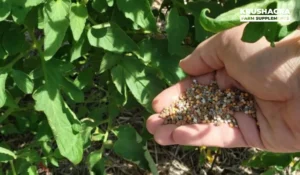Nematodes are microscopically worm-like organisms that live in soil films and water-filled pore spaces. They are usually most abundant in the upper layers of soil, where organic matter, plant roots, and other resources are most abundant. Potato and beetroot plants are susceptible to nematode infestation, which can lead to reduced yields and poor plant health. However, chemical pesticides can have adverse effects on the environment and beneficial insects. Fortunately, biopesticides offer a safe and sustainable alternative to control nematodes. In this blog post, we review how biopesticides can be used to effectively control nematode populations in potato and beetroot plants, promote healthy plant growth, and maximize yields.
Understanding Nematodes and their Impact
Most nematodes are completely harmless. Many play important roles in the environment, such as the free-living nematodes that provide nutrients to plants. But harmful nematodes like hookworms are downright destructive. Of the trillions and millions of nematodes worldwide, most are essential to the processes that sustain plant life. But there are other nematodes that strangle crops and infect humans.These harmful nematodes feed on plant roots, damaging plants and interfering with their ability to grow and produce healthy plants. They cause disease in plants and can lead to reduced yields and even plant death.
Nematodes are tiny worms found in soil, water, and even plants. They are so small that they cannot be seen without a microscope. Nematodes occur naturally in the environment and their numbers can increase under favorable conditions, such as when the soil is warm and moist. Factors such as inadequate crop rotation practices, contaminated soil, and the presence of susceptible plant cultivars may also contribute to the emergence and spread of harmful nematodes.
How do Pesticides Control Nematodes?
Biopesticides control nematodes through predation, parasitism, or other mechanisms. Beneficial nematodes, such as Steinernema species and Heterorhabditis species, act as biocontrol agents by chasing and infecting pest nematodes. Some biopesticides contain parasites and bacteria that infect and kill nematodes. Other biopesticides can interfere with nematode growth, reproduction, or development through enzymatic activity or by interfering with nematode physiological processes. These biopesticides offer an environmentally friendly alternative to traditional chemical pesticides and can help effectively control nematode populations in agricultural systems.
Biopesticides use natural and environmentally friendly methods to control nematodes. They contain beneficial microbes such as tiny worms and bacteria that help get rid of harmful nematodes. These microbes either eat bad nematodes or infect them, causing them to die. It’s like having good bugs in your garden and eating the pests. Some biopesticides also affect the growth and offspring-forming ability of nematodes, making them more difficult to survive and reproduce. The great thing about biopesticides is that they don’t use harmful chemicals, so they’re better for the plants, the soil, and the organisms that live there. Farmers can use biopesticides to control nematodes and protect their crops in a safe and environmentally friendly way.
Types of Biopesticides used for Nematodes
Various types of biopesticides are commonly used in agriculture to control nematodes. These include beneficial nematodes, microbial biopesticides, and plant extracts. These biopesticides offer a safe and sustainable alternative to conventional chemical pesticides and contribute to a greener approach to nematode control in agriculture.
- Useful Nematodes:Certain species of beneficial nematodes, such as Steinernema and Heterorhabditis, are effective biocontrol agents against plant-parasitic nematodes. These nematodes actively seek out and infect harmful nematodes, resulting in nematode death. For application, the beneficial nematodes are mixed with water and applied to the soil surrounding the plant.
- Microbial Biopesticides:Microorganisms such as bacteria and fungi can also fight nematodes. For example, Bacillus thuringiensis (Bt) is a soil bacterium that produces toxins that are toxic to nematodes. It can be applied as a soil irrigation or incorporated into the soil before planting. Similarly, fungi such as Pochonia Chlamydosporia parasitic nematodes reduce their numbers. These microbial biopesticides can be used in soil amendments and seed treatments.
- Natural Extracts:This is more of a home grown solution and less compatible with mechanized agricultural practices. Plant extracts like neem and garlic have shown potential in nematode control. Neem oil contains compounds with insecticidal and nematicidal properties. Applying neem oil to soil or using it as a foliar spray can disrupt nematode life cycles, inhibit nematode feeding, and reduce reproduction. It acts as a natural repellent and can also affect nematode egg development and hatching. Garlic extract is another botanical option being studied for its potential in nematode control. Garlic contains sulfur compounds which have antibacterial and insecticidal properties. Using garlic extract as a soil conditioner or incorporating it into the soil has shown some efficacy in controlling nematode populations.
Application Techniques for Effective Nematode Control in Potato and Beetroot Crops
Effective use of biopesticides is essential for nematode control. Here are some recommended techniques:
- Soil Soaking:Prepare solutions of biopesticides according to the instructions provided. Apply the solution evenly to the soil around the plant and cover tightly. This method brings the biopesticide into direct contact with the nematodes in the root zone.
- Soil incorporation:Mix biopesticides into the soil before planting. This ensures that beneficial microorganisms and compounds are distributed throughout the soil and attack nematodes at various depths.
- Seed Treatment:Some biopesticides can be applied directly to seeds before planting. This allows the biopesticide-derived seedlings to be protected from nematode infestation.
End Note
Biopesticides offer an environmentally friendly approach to control nematodes in potato and beetroot crops. By using beneficial nematodes and microbial biopesticides, farmers can effectively control nematode populations while minimizing environmental damage. Appropriate application techniques and integration into IPM (Integrated Pest Management) strategies increase the overall success rate of nematode control.





